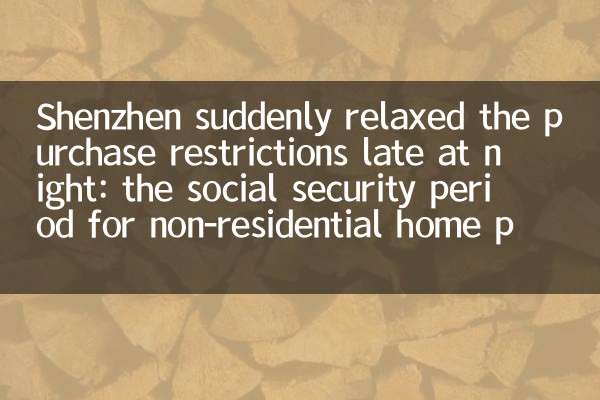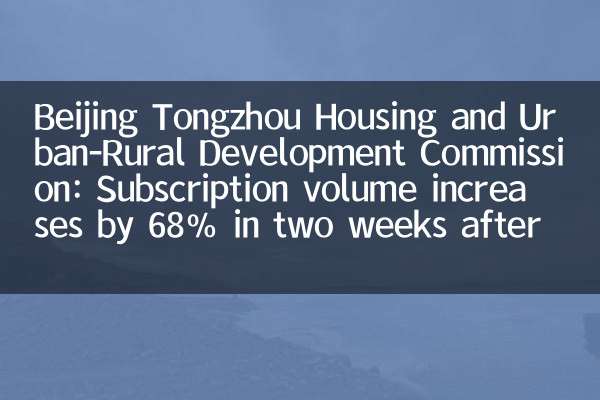Shanghai pilots the acquisition and storage of existing housing to be purchased and transferred to affordable housing: Special bond funds support real estate companies to resolve inventory
Recently, Shanghai launched an innovative policy pilot project - to collect and store housing into affordable housing through special bond funds, aiming to resolve the inventory pressure of real estate companies and expand the supply of affordable housing. This move has sparked heated discussions across the Internet and has become a hot topic in the financial and real estate fields in the past 10 days. The following are structured data analysis and policy interpretation.
1. Core content of policy

According to documents issued by the Shanghai Municipal Housing and Urban-Rural Development Commission, this pilot mainly includes the following key points:
| Policy dimension | Specific content |
|---|---|
| Source of funds | Local government special bonds (the first batch is expected to be 5 billion yuan) |
| Storage standards | Ordinary commercial housing completed and unsold in real estate companies' inventory (single unit ≤120㎡) |
| Conversion direction | Public rental housing, affordable rental housing |
| Price mechanism | Acquisition based on market appraisal price 80%-85% |
| Pilot scope | The first batch of implementations in Pudong New Area and Jiading District |
2. Market response data
After the policy was announced, the capital market and real estate market showed significant changes:
| index | Variation range | Time period |
|---|---|---|
| A-share real estate index | +5.2% | Three trading days after the policy is released |
| Average daily transaction volume of commercial housing in Shanghai | +18.7% | In the past week (compared with the same period last month) |
| Real estate company bond yield | Decreased by 40-60BP | After the policy is released |
| Number of consultations on affordable housing applications | 3 times | Data of housing security centers in each district |
III. Analysis of policy impact
1.Real estate enterprise level: Directly alleviate the liquidity pressure of some developers. Taking a leading real estate company as an example, it has about 2,000 houses in stock in Shanghai. If it is fully acquired according to the policy, it can recover about 3 billion yuan of funds.
2.Affordable housing system: It is expected that more than 10,000 new affordable housing units will be supplied this year, increasing the coverage rate of Shanghai's affordable housing from 28% to 31%.
3.Financial effects: Special bond funds form a closed loop of "acquisition-leasing-repayment". It is estimated that the annual rental yield is 4.5%, and the principal and interest of the bond can be covered within 10 years.
4. Comparison of expert opinions
| mechanism | Summary of opinion | Risk warning |
|---|---|---|
| CICC | "Innovatively resolve inventory, expected to be replicated to other high-inventory cities" | Beware of rent returns below expectations |
| JLL | "Accurately connect with the housing needs of new citizens and optimize resource allocation" | A dynamic price adjustment mechanism needs to be established in the long run |
| Huaxia Think Tank | "Financial risks are controllable, but they need to provide supporting tax preferential policies" | Avoid squeezing the market-oriented rental market |
5. Netizens' hot topics
1.Application conditions: More than 60% of the discussions focus on whether the access standards for affordable housing are relaxed;
2.Rent pricing: About 35% of netizens suggest setting up a gradient rental system;
3.Property quality: Some citizens are worried that real estate companies may give priority to dealing with defective housing sources.
6. Follow-up promotion plan
According to official disclosure, three key nodes will be completed before the third quarter of 2024:
- At the end of June: Complete the first batch of special bond issuance
- Mid-August: Establish a digital housing management platform
- End of September: Delivery of the first batch of 5,000 units
The pilot is regarded as an important exploration of the "new development model" of real estate, and its effectiveness will directly affect the formulation of national policies. It is worth noting that the policy particularly emphasizes the principle of "marketization and rule of law", and clearly requires that the acquisition process be open and transparent, and avoids administrative intervention in the market price formation mechanism.

check the details

check the details